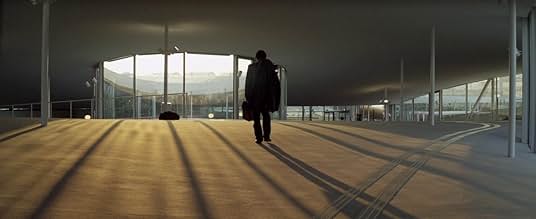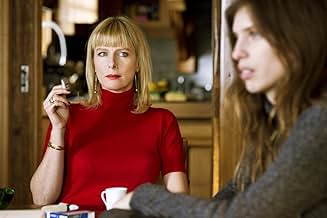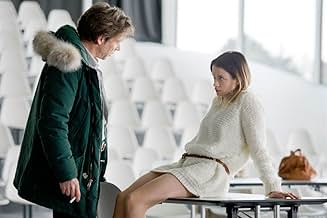IMDb-BEWERTUNG
5,8/10
2218
IHRE BEWERTUNG
Nach einer kurzen Affäre mit ihrem verführerischen Professor verschwindet eine junge Studentin auf mysteriöse Weise. Die Polizei und die Stiefmutter des Mädchens sind dem geheimnisvollen Leh... Alles lesenNach einer kurzen Affäre mit ihrem verführerischen Professor verschwindet eine junge Studentin auf mysteriöse Weise. Die Polizei und die Stiefmutter des Mädchens sind dem geheimnisvollen Lehrer auf den Fersen.Nach einer kurzen Affäre mit ihrem verführerischen Professor verschwindet eine junge Studentin auf mysteriöse Weise. Die Polizei und die Stiefmutter des Mädchens sind dem geheimnisvollen Lehrer auf den Fersen.
- Regie
- Drehbuch
- Hauptbesetzung
- Auszeichnungen
- 2 Nominierungen insgesamt
Carl von Malaisé
- Le policier à moto
- (as Carl von Malaise)
Alain Börek
- Le collègue de Marc
- (as Alain Borek)
Empfohlene Bewertungen
At one point in this movie, the protagonist, a creative writing college professor (Matthieu Americ) with a taste for his nubile female students, gives a creative writing exercise where he tells students to write something based, not on character or story, but on a "landscape". That's kind of what this movie itself is. The plot and characters are definitely very serviceable with the professor suspected of being behind the disappearance of a female student he is seen in the carnal company of at the beginning, and neither the viewer or the perhaps the protagonist himself (who is given to severe "headaches") really sure of his guilt. Instead of being the usual married French cad though, the professor lives in an isolated mountain villa in a rather incestuous relationship with his sister (Karen Viard), who might be propping up his career via her sexual relationship with the college dean. Meanwhile, the suspicions swirling around don't stop him from getting sexually involved with the missing girl's alluring stepmother (Maiwenn LeBesco) or being pursued by the hot-to-trot daughter of a big university donor (Sara Forestier), who wants him to give her "private lessons" in, uh, creative writing.
This movie though, despite being basically a TV film, really benefits the most from its great "landscape". It is set in a wintry French alpine village and has great crisp cinematography (I don' know if it's digital, but if so digital has come a LONG way). The natural beauty is well matched by the incredible modern glass architecture of the mountain college where a lot of this takes place. Besides having the most beautiful female students I've ever seen, the professor also teaches in probably the nicest classroom that ANY creative writing professor has ever taught in.
Americ is definitely a talented and charismatic actor, who is very big in French film and has even left France to play James Bond villains. He manages to make his coed-molesting--and possibly murderous--anti-hero genuinely likable. But the OTHER part of the gorgeous "landscape" here frankly is the sumptuous female bodies on display. Sara Forstier is so irresistibly sexy that it beggars belief that the professor even tries. Maiwen LeBesco is also really something. It IS pretty funny though that she seems to be the only French actress I know of to use a "body double" for nude scenes given that her little sister, the equally voluptuous actress Isild LeBesco, only leaves her clothes ON in a movie if it's absolutely necessary to the plot (maybe Isild is her older sister's "body double"?). Although she's more famous (largely as the result of her shotgun teen wedding to director Luc Besson and appearances in a number of his films), I've never personally thought Maiwenn was nearly as talented as her sister, but she's really good here.
I don't want to take anything away from Americ or the very decent (if not always believable) story, but it is the "landscape--of natural scenery, modern architecture, and, yes, female flesh--that real makes this movie.
This movie though, despite being basically a TV film, really benefits the most from its great "landscape". It is set in a wintry French alpine village and has great crisp cinematography (I don' know if it's digital, but if so digital has come a LONG way). The natural beauty is well matched by the incredible modern glass architecture of the mountain college where a lot of this takes place. Besides having the most beautiful female students I've ever seen, the professor also teaches in probably the nicest classroom that ANY creative writing professor has ever taught in.
Americ is definitely a talented and charismatic actor, who is very big in French film and has even left France to play James Bond villains. He manages to make his coed-molesting--and possibly murderous--anti-hero genuinely likable. But the OTHER part of the gorgeous "landscape" here frankly is the sumptuous female bodies on display. Sara Forstier is so irresistibly sexy that it beggars belief that the professor even tries. Maiwen LeBesco is also really something. It IS pretty funny though that she seems to be the only French actress I know of to use a "body double" for nude scenes given that her little sister, the equally voluptuous actress Isild LeBesco, only leaves her clothes ON in a movie if it's absolutely necessary to the plot (maybe Isild is her older sister's "body double"?). Although she's more famous (largely as the result of her shotgun teen wedding to director Luc Besson and appearances in a number of his films), I've never personally thought Maiwenn was nearly as talented as her sister, but she's really good here.
I don't want to take anything away from Americ or the very decent (if not always believable) story, but it is the "landscape--of natural scenery, modern architecture, and, yes, female flesh--that real makes this movie.
'Love is the Perfect Crime' ('L'amour est un crime parfait' in French) is one of the most formidable movie titles I can remember. A title that promises a combination of thriller and love story, which is indeed part of what the 2013 film directed by brothers Arnaud and Jean-Marie Larrieu proposes. The presence in the main role of Mathieu Amalric, one of my favorite French actors, heightened my curiosity to see this film. Of the many promises, only a part were justified.
Switzerland at the end of winter is the setting for the film. The snow-covered mountains represent since Hitchcock a scenery for films in the psychological thriller genre, with sunshine illuminating postcards landscapes behind which we can feel the threat, with snow covering tracks, traces and sometimes bodies, at least until the thaw. We deal with a plot in which part of the truth is hidden from viewers, which is a rule in most detective movies, but in this case the truth is hidden also to the heroes on the screen. Ambiguity is what characterizes their characters and feelings in this film. We are dealing with a criminal investigation (a student has disappeared and her teacher, a man with a fame of conqueror is one of the suspects) and with a late love story, but the reality behind the appearances is questionable to the very end.
What I liked: The role of Marc, the teacher of literary creation around which orbit the female students, but who is secretly haunted by his own traumas is perfect for Mathieu Amalric, who dominates the screen and the story with his feelings and dilemmas. The film is made 2-3 years before the 'me too' scandals broke out and the role would probably have been written differently if the film had been made now. The atmosphere of the Swiss university intellectual circles with their professional and romantic intrigues is very well rendered. The image is stylish and consistent. What I liked least: There are three women characters around Marc and the actresses' creations are uneven. If the interpreters of Marianne (Marc's sister - Karin Viard) and Annie (the student trying to lure Marc into a love affair - Sara Forestier) are neutral, Anna's key character is missed by Maïwenn's interpretation. The script suffers from a certain verbosity that makes the film seem long and repetitive from time to time. The ambiguity of the approach ultimately turns against the intentions of the filmmakers, and many viewers will already have been lost interest in the denouement by the end of the movie. Yet another proof that the performance of one single actor, no matter how good he may be, cannot sustain alone an entire movie.
Switzerland at the end of winter is the setting for the film. The snow-covered mountains represent since Hitchcock a scenery for films in the psychological thriller genre, with sunshine illuminating postcards landscapes behind which we can feel the threat, with snow covering tracks, traces and sometimes bodies, at least until the thaw. We deal with a plot in which part of the truth is hidden from viewers, which is a rule in most detective movies, but in this case the truth is hidden also to the heroes on the screen. Ambiguity is what characterizes their characters and feelings in this film. We are dealing with a criminal investigation (a student has disappeared and her teacher, a man with a fame of conqueror is one of the suspects) and with a late love story, but the reality behind the appearances is questionable to the very end.
What I liked: The role of Marc, the teacher of literary creation around which orbit the female students, but who is secretly haunted by his own traumas is perfect for Mathieu Amalric, who dominates the screen and the story with his feelings and dilemmas. The film is made 2-3 years before the 'me too' scandals broke out and the role would probably have been written differently if the film had been made now. The atmosphere of the Swiss university intellectual circles with their professional and romantic intrigues is very well rendered. The image is stylish and consistent. What I liked least: There are three women characters around Marc and the actresses' creations are uneven. If the interpreters of Marianne (Marc's sister - Karin Viard) and Annie (the student trying to lure Marc into a love affair - Sara Forestier) are neutral, Anna's key character is missed by Maïwenn's interpretation. The script suffers from a certain verbosity that makes the film seem long and repetitive from time to time. The ambiguity of the approach ultimately turns against the intentions of the filmmakers, and many viewers will already have been lost interest in the denouement by the end of the movie. Yet another proof that the performance of one single actor, no matter how good he may be, cannot sustain alone an entire movie.
This is my third Larrieu brothers film. I like their work because they have found a way to work within the film industry that does not involve the streets and houses of Paris (however beautiful these streets and houses may be). The peace and quietude of the Pyrenees are their environment, and the source of the pleasure these films bring me.
The acting by Amalric, Viard, Maiwenn and Forestier is strong. The occasional unlikely development in the script doesn't bother me because the actors are on target all the time. How about Forestier as the nightmare co-ed of the decade, if not of all time? And Karin Viard whose neurotic sister is very well drawn. Amalric always impresses me, he's really the strongest actor in France now. Only trouble: 10-15 minutes could easily have been cut to make a tighter story.
The acting by Amalric, Viard, Maiwenn and Forestier is strong. The occasional unlikely development in the script doesn't bother me because the actors are on target all the time. How about Forestier as the nightmare co-ed of the decade, if not of all time? And Karin Viard whose neurotic sister is very well drawn. Amalric always impresses me, he's really the strongest actor in France now. Only trouble: 10-15 minutes could easily have been cut to make a tighter story.
A magnificent and intoxicating serial killer film set in the icy landscapes of Switzerland. Everything revolves around Marc, a sensualist and disturbed literature professor. His extremely literary way of expressing himself is undoubtedly impossible to apply in real life, but verisimilitude is not necessary. His intensity is fabulous, especially the way he looks at women, the way he fills his eyes and mind with them. Mathieu Amalric is just fantastic in this role. Note the excellent music of Caravaggio, subtle electronic tracks which embrace the rounded modernity of the university where Marc works. The Larrieu brothers once again excel in maintaining a floating and uncertain spirit in the film, whose main character gradually, almost voluptuously, loses his footing. Wonderful.
The movie is so strange that probably even its creators don't know what they wanted to say. There's a lot of snow accompanied by endless tobacco smoking, sexually obsessed girls, sick professor and pointless dialogs.
There's no thrill in this thriller, and there's no decent acting. However, the landscape and the urban design are really beautiful, and that's why I added one point. This is a movie that would've been much, much better if nobody filmed it.
Wusstest du schon
- WissenswertesFrench visa # 135966.
- PatzerMarc is a Literature teacher at the University of Lausanne. However, the campus shown in the movie is that of the EPFL, which specializes in science and technology.
- VerbindungenFeatures Das goldene Zeitalter (1930)
- SoundtracksL'un dans l'autre
Performed by Erik Truffaz and Christophe
Top-Auswahl
Melde dich zum Bewerten an und greife auf die Watchlist für personalisierte Empfehlungen zu.
- How long is Love Is the Perfect Crime?Powered by Alexa
Details
- Erscheinungsdatum
- Herkunftsländer
- Offizieller Standort
- Sprache
- Auch bekannt als
- Love Is the Perfect Crime
- Drehorte
- Produktionsfirmen
- Weitere beteiligte Unternehmen bei IMDbPro anzeigen
Box Office
- Weltweiter Bruttoertrag
- 2.907.305 $
- Laufzeit1 Stunde 50 Minuten
- Farbe
- Sound-Mix
- Seitenverhältnis
- 2.35 : 1
Zu dieser Seite beitragen
Bearbeitung vorschlagen oder fehlenden Inhalt hinzufügen

Oberste Lücke
By what name was Liebe ist das perfekte Verbrechen (2013) officially released in India in English?
Antwort























